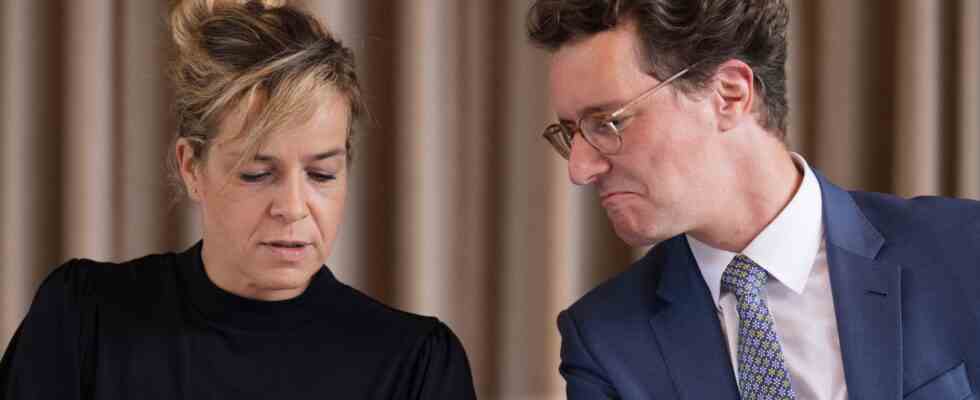analysis
Status: 06/28/2022 2:50 p.m
The North Rhine-Westphalian state parliament has re-elected Hendrik Wüst as head of government. The country’s first black-green coalition has big plans – and both parties are under pressure.
You can deal with pressure either way. The head of the future state government made up of CDU and Greens in North Rhine-Westphalia is just one example. While Hendrik Wüst is rather rare in the media, primarily giving short answers to long questions, it is the other way around with Mona Neubaur, the future Deputy Prime Minister of the Greens: If the tension is particularly high, she tends to talk without a period and Comma, one set of phrases from the construction kit of green world-improvement rhetoric then follows the next.
They both have pressure. As the new strong man in the CDU, Wüst not only had to negotiate a coalition with the Greens. From the point of view of the CDU, this has been successful; there is no other way to explain the party’s overwhelming approval of the agreement. Now Wüst must set up his government team without stumbling over internal party pitfalls. After all, many a supporter from the very beginning hopes to be rewarded now. Gender parity, regional proportional representation, party wings: there are a number of things to consider.
Forming a government always brings disappointments, and after all, nothing should go wrong in the last few meters. Given the comfortable majority of 18 votes, Wüst could afford one or two dissenters, but that is not his understanding. There may be types of players in politics who are looking for risk, Wüst is not one of them.
The Burden of Responsibility
Mona Neubaur has been aware of the burden of responsibility since election night. Negotiating an alliance with the CDU and governing Germany’s largest industrial country for five years is no small feat given the huge expectations of your own party. Especially if, like Neubaur, you have no government experience and little parliamentary experience.
Since the Greens see themselves as a program party that is primarily concerned with the content, they have to be measured against it. The pressure from environmental groups and climate activists is great, they are not satisfied with the coalition agreement. The Green Youth in particular sees itself as the voice of this displeasure and has been publicly opposing the agreement with the CDU for days. At the Green party conference, they consistently voted against it.
Lots of room for wind power
At first glance, the contract bears a green handwriting: coal phase-out 2030, priority for wind power, solar roof obligation, more cycle paths, less surface consumption. The voting age is to be lowered to 16 for the next state elections, and the position of an independent police officer is to be created. The CDU, on the other hand, was able to tie down its course on internal security and can continue to focus on reducing bureaucracy and strengthening medium-sized businesses and the skilled trades.
Was it distrust or passion? In any case, the level of detail that the negotiators indulged in on the subject of wind power is remarkable. Four of the 146 pages deal only with wind energy: the interlocking of federal, state and regional planning, the necessary increase in the number of jobs in the authorities, participation in value creation and lending – all potential obstacles to the expansion of wind power have been considered. The reader wonders whether this is still a coalition agreement or already instructions for assembling wind turbines.
Expectable and surprising
The following chapters give an idea of which party has drawn the pen. The architecture of future governance will become clear on the last page of the contract at the latest, because the allocation of departments between the parties is recorded there. This framework is a mixture of the expectable and the surprising.
Finances, municipal affairs, internal affairs, health and work were only officially confirmed for the CDU. It was also to be expected that the Greens would get a “super ministry” made up of business, industry, climate and energy – the Düsseldorf counterpart to the Habeck Ministry in Berlin. Likewise with the responsibility for family, equality and integration. On top of that, the Greens will nominate the Minister of Justice. He should form the counterweight to CDU heavyweight Herbert Reul in the interior department.
What is surprising is that the Greens agreed to smash the former environment and agriculture ministries. That went too far for some green negotiators, who publicly aired their dissatisfaction. Instead, there is a new department for the Greens from the environment, nature conservation and transport. The fact that the CDU took over the areas of agriculture and forestry was probably a concession to the strong CDU base in rural areas.
“Never Again Ministry of Education”
A department with which elections are rarely won, but easily lost, is school policy in all federal states. The last two elections in NRW have shown this impressively. In 2017, the Greens halved their result, and the party pressured Löhrmann, the Green School Minister who had been voted out, to relinquish her mandate. “Never, never, never again the Ministry of Education” could be heard from the Greens.
Now the CDU is trying its luck there and can at least slow down the dreaded eagerness for reform from the left. It is still unclear who will succeed the liberal Yvonne Gebauer in the ministry. Wüst plays it safe and only announces his CDU cabinet list after his re-election. The frustration that inevitably arises because the number of those hoping for promotion is always greater than the number of posts to be distributed should not be discharged when he is elected.
Kuchaty: “A coalition of higher earners”
Opposition leader Thomas Kutschaty (SPD) has little to gain from the coalition agreement. “Unambitious” is the work. “Workers will not have much to expect from this government,” he says. In his opinion, the CDU and the Greens form a “coalition of higher earners”. The SPD already senses its chance to distinguish itself in social policy.
In his first political life, as a young general secretary under Prime Minister Jürgen Rüttgers (CDU), Wüst appeared as a dashing conservative. Until he resigned after a political affair in 2010. After being elected state chairman last fall, he opted for a different style.
With gestures of humility and a friendly demeanor, he paints the picture of a reformed politician who has learned from his mistakes. He appears as a young, modern father of the country who likes to get on his bike and is good with the Greens. He lets the social networks play with beautiful pictures, with Mona Neubaur he is now on first name terms.
What remains after the euphoria of the beginning?
But Wüst can also be different. He is now using his electoral success to secure his home power in the CDU internally as well. Officially, the previous parliamentary group leader Löttgen and Finance Minister Lienenkämper are retiring for personal reasons. Since everyone in Düsseldorf knows that they were not members of the Wüst fan club, there is another interpretation.
Wüst is now one of the most powerful CDU men in the country. “The party is now doing what he wants,” says a leading Christian Democrat. At the age of 46 he was prime minister and chairman of the Union’s regional association with the largest number of members. And team leader of a black-green government, which, according to observers, could also serve as a model for the federal government if successful.
The success or failure of this government probably depends above all on the question of how well blacks and greens get along with each other once the initial euphoria has worn off. Can you withstand the pressure? Or will the first major crisis throw them off course? As I said: You can deal with pressure either way.


